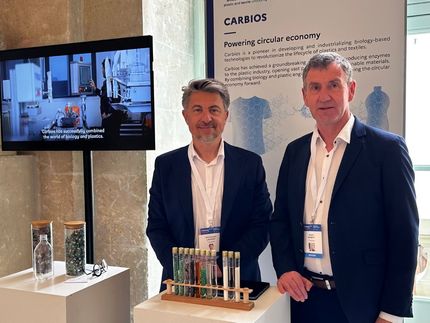Upcycling with re-strap
Start-up develops high-quality secondary raw materials according to customer requirements to increase recyclate usage rates in plastic products
Two years ago, re-strap GmbH launched the world's first system for taking back and collecting used plastic strapping. From the outset, the declared aim was to recycle the collected raw materials to the highest possible quality. After two years of development, the company now offers plastic recyclates according to customer specifications for technical applications on this basis.

Compound
re-strap GmbH
Recyclate usage rates of 30% and more are consistently required for plastic products. According to the Conversio study "Material flow picture for plastics in Germany 2021", the proportion of recyclate from post-consumer waste in new plastic products in Germany is currently only around 9.1%. A higher use of recyclate is not possible due to the availability and quality of the corresponding raw materials. Thanks to its own collection system, re-strap has access to an additional secondary raw material stream that has not yet been tapped. This is characterized by a defined and reproducible composition. Furthermore, the individual batches can be traced back to the industrial source.
re-strap now has a modular system for industrially usable granulates with a recyclate content of up to 70%. Through a targeted combination of secondary raw materials and formulations, this enables the production of fiber-reinforced compounds based on recycled materials that are in no way inferior to the use of virgin material.
"We develop the secondary raw material required by the customer according to their specifications," says Managing Director Matthias Schäfer. "We are currently starting on the basis of PET, and PP will be added later. But we can already replace virgin material made from other plastics such as PBT or PA6. Thanks to our own collection and take-back system, we can ensure both the availability of materials and the required purity and quality," Schäfer continues. "In this way, we are contributing to greater sustainability and CO2 savings while at the same time offering our customers raw material security."
The University of Sankt Gallen also presented the re-strap system as a use case for improved recycling in its consortium study "Green Packaging" - Good Practices for the Selection of Ecologically Sustainable Industrial Packaging.
Note: This article has been translated using a computer system without human intervention. LUMITOS offers these automatic translations to present a wider range of current news. Since this article has been translated with automatic translation, it is possible that it contains errors in vocabulary, syntax or grammar. The original article in German can be found here.
Organizations
Other news from the department business & finance

Get the chemical industry in your inbox
By submitting this form you agree that LUMITOS AG will send you the newsletter(s) selected above by email. Your data will not be passed on to third parties. Your data will be stored and processed in accordance with our data protection regulations. LUMITOS may contact you by email for the purpose of advertising or market and opinion surveys. You can revoke your consent at any time without giving reasons to LUMITOS AG, Ernst-Augustin-Str. 2, 12489 Berlin, Germany or by e-mail at revoke@lumitos.com with effect for the future. In addition, each email contains a link to unsubscribe from the corresponding newsletter.
Most read news
More news from our other portals
Something is happening in the chemical industry ...
This is what true pioneering spirit looks like: Plenty of innovative start-ups are bringing fresh ideas, lifeblood and entrepreneurial spirit to change tomorrow's world for the better. Immerse yourself in the world of these young companies and take the opportunity to get in touch with the founders.
























































